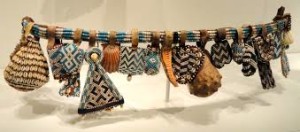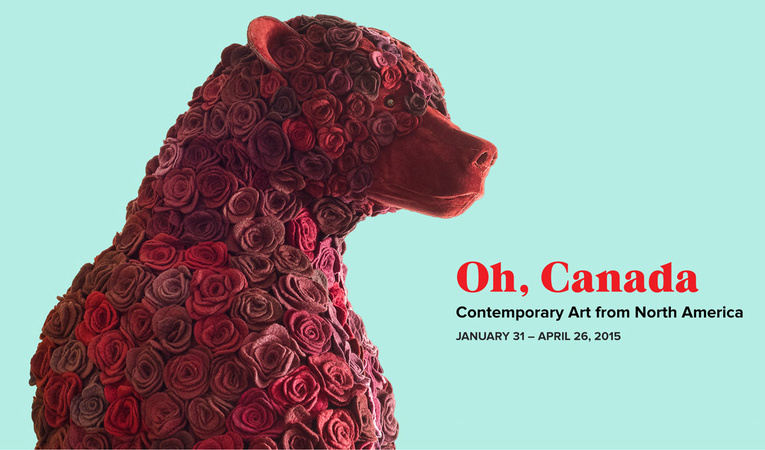 Max, ever the storyteller, well versed in the subtlety of suspense, says “but wait a minute” and opens the jacket to expose its lining. He points to a label, not yet arousing any sense of what’s next: JC Penney. Yes, on the label is JC Penney–the American clothier has their name on a jacket made to commemorate Mobutu. Not just Mobutu, but Mobutu on the occasion of 1974’s Rumble in the Jungle, the legendary boxing match between black Americans Muhammad All and George Foreman, a remarkable event that showcased black athletes in the context of African post-colonialism and the politics of black nationalism across the diaspora.
Max, ever the storyteller, well versed in the subtlety of suspense, says “but wait a minute” and opens the jacket to expose its lining. He points to a label, not yet arousing any sense of what’s next: JC Penney. Yes, on the label is JC Penney–the American clothier has their name on a jacket made to commemorate Mobutu. Not just Mobutu, but Mobutu on the occasion of 1974’s Rumble in the Jungle, the legendary boxing match between black Americans Muhammad All and George Foreman, a remarkable event that showcased black athletes in the context of African post-colonialism and the politics of black nationalism across the diaspora. Cloth is a distillation of politics

Cloth is a distillation of politics across the diasporic experience. It reflects issues of growing concern that impact the political, social and economic lives of the many communities that cohere around its symbolism. Spending time with Allen I learned that he also moves–in the sense that he readily takes on the critique of social messages that many of these politically charged banners, cloths and ready-to-wear pieces inhabit. Movement, then, is a conceptual basis for developing coherence. The artists making cloth under these conditions engage a means to represent communities and nations across borders.
For example, the exhibition featured a number of tailored ready-to-wear pieces that clearly spoke to the movement of African nationalisms across the black world. The men’s jacket bearing a somewhat youthful and authoritative image of Joseph Mobutu, late ruler of Zaire, is a powerful example of the ways that nationalism, authoritarianism and popular myth-making converge to make lasting impressions about statesmanship in the post-colonial era. Allen, a former producer with CBC Radio, carefully spreads the coat on a large table. An exquisite explosion of green, reds, yellows, blues and blacks practically encircles a very manly image of Mobutu; it’s a joy to behold.
 Max, ever the storyteller, well versed in the subtlety of suspense, says “but wait a minute” and opens the jacket to expose its lining. He points to a label, not yet arousing any sense of what’s next: JC Penney. Yes, on the label is JC Penney–the American clothier has their name on a jacket made to commemorate Mobutu. Not just Mobutu, but Mobutu on the occasion of 1974’s Rumble in the Jungle, the legendary boxing match between black Americans Muhammad All and George Foreman, a remarkable event that showcased black athletes in the context of African post-colonialism and the politics of black nationalism across the diaspora.
Max, ever the storyteller, well versed in the subtlety of suspense, says “but wait a minute” and opens the jacket to expose its lining. He points to a label, not yet arousing any sense of what’s next: JC Penney. Yes, on the label is JC Penney–the American clothier has their name on a jacket made to commemorate Mobutu. Not just Mobutu, but Mobutu on the occasion of 1974’s Rumble in the Jungle, the legendary boxing match between black Americans Muhammad All and George Foreman, a remarkable event that showcased black athletes in the context of African post-colonialism and the politics of black nationalism across the diaspora.
 Max, ever the storyteller, well versed in the subtlety of suspense, says “but wait a minute” and opens the jacket to expose its lining. He points to a label, not yet arousing any sense of what’s next: JC Penney. Yes, on the label is JC Penney–the American clothier has their name on a jacket made to commemorate Mobutu. Not just Mobutu, but Mobutu on the occasion of 1974’s Rumble in the Jungle, the legendary boxing match between black Americans Muhammad All and George Foreman, a remarkable event that showcased black athletes in the context of African post-colonialism and the politics of black nationalism across the diaspora.
Max, ever the storyteller, well versed in the subtlety of suspense, says “but wait a minute” and opens the jacket to expose its lining. He points to a label, not yet arousing any sense of what’s next: JC Penney. Yes, on the label is JC Penney–the American clothier has their name on a jacket made to commemorate Mobutu. Not just Mobutu, but Mobutu on the occasion of 1974’s Rumble in the Jungle, the legendary boxing match between black Americans Muhammad All and George Foreman, a remarkable event that showcased black athletes in the context of African post-colonialism and the politics of black nationalism across the diaspora. 